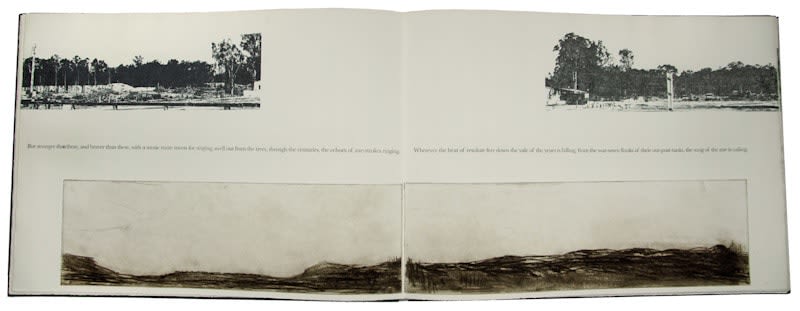Marie E. J. Pitt; Monica Oppen (illus.)
Do Not Lament, 2018
Stanmore, NSW, Australia: Ant Press
One of seven copies.
1324
Further images
Oblong quarto. (16)pp. In drypoints, transfer-printed photographs, and bold typographic styling, Oppen sets altered landscapes before the viewer and confronts the oppression of the natural features of Australia by humankind....
Oblong quarto. (16)pp. In drypoints, transfer-printed photographs, and bold typographic styling, Oppen sets altered landscapes before the viewer and confronts the oppression of the natural features of Australia by humankind. Her panoramic etchings show vistas lying barren and dark, while the companion photographs witness in the historical record the roads, signs, vehicles, and arid plots dominating the receding treeline. The book culminates in a two-page foldout in which Oppen's etched trees, themselves seeming more ghostly the longer the reader looks, are interrupted by a numbered grid of land divisions-the ultimate example of the imposition of human endeavors over the organic course of the environment. Oppen's poem, printed in gold and cascading wherever it appears over two pages, is found on the inside of the book's clamshell box, at the closed foldout spread, and hidden between frenchfold pages; in it, she perhaps cynically, perhaps hopefully, calls the reader to not lament for the fallen branches or for the factories that have arisen in their place. Oppen's verses converse with those of Marie Pitt, which bewail the axe as a symbolic instrument of "the pageants of power and plunder." Pitt's poem was first published in 1925, and though she was not without flaw (her racism has been well documented) she remained throughout her life a firm activist for Australian socialist and labor movements. Bound in leather-backed boards covered in cloth. Trace exterior rubbing to tree motif at covers, though this coheres nicely with the book's point. Fine.









